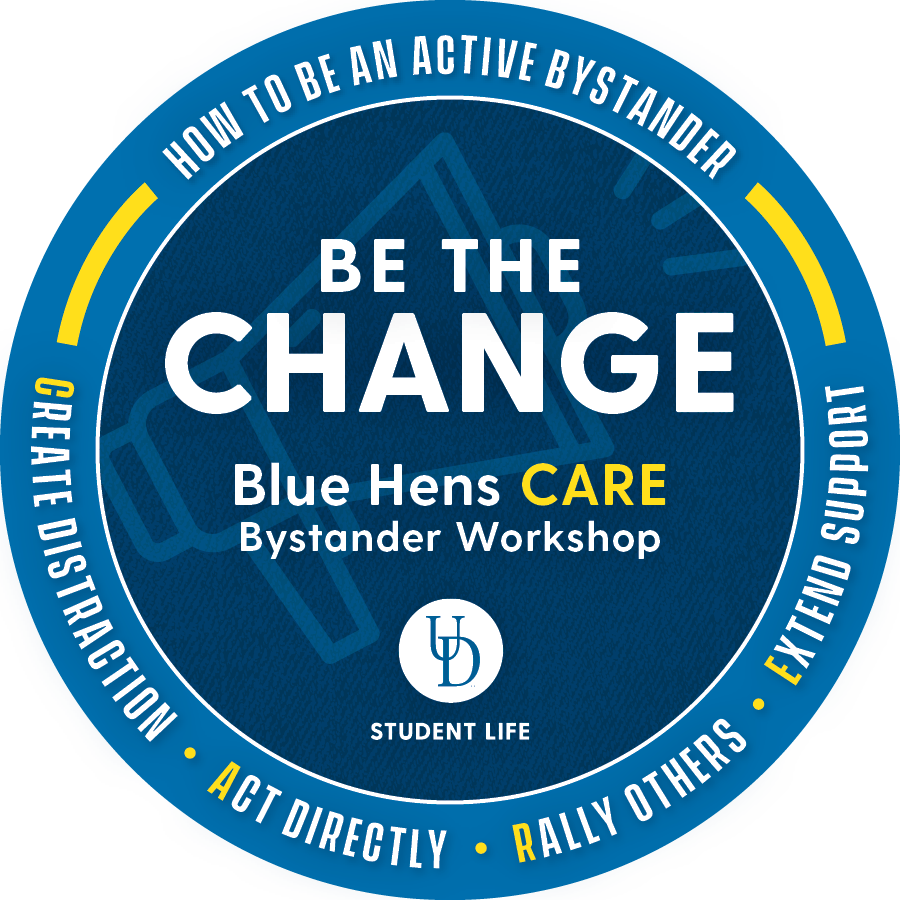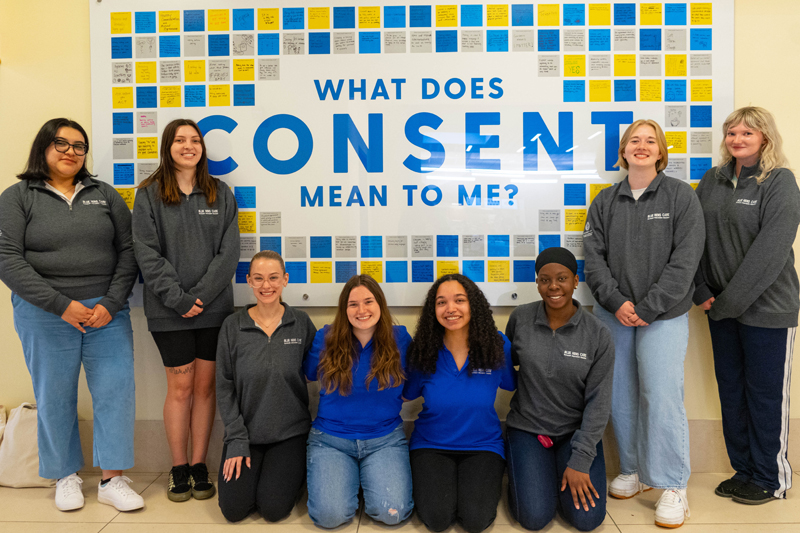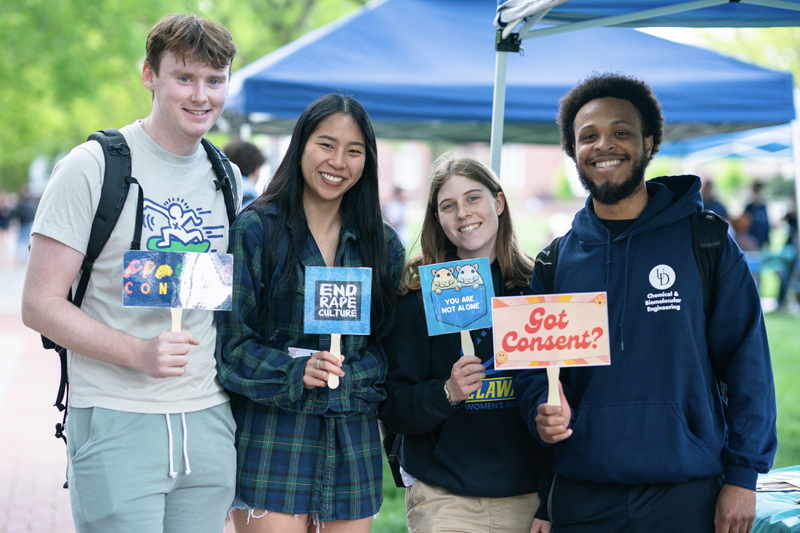
Sexual Misconduct Prevention and Response

Sexual Misconduct Prevention and Response
Student Wellness and Health Promotion (SWHP) is committed to creating social change in order to foster a community of respect, safety and care. SWHP engages in a trauma-informed, victim-centered, multi-faceted approach to prevention, education and intervention efforts. Through intentional partnership within our campus community, our work aims to create awareness, address inequities and oppression and encourage a sense of responsibility throughout our Blue Hen community.
Blue Hens CARE: How to Be an Active Bystander
What is Bystander Intervention?
It’s a way to interrupt harmful situations and support people who are targeted. Actively intervening sends a signal that this behavior isn’t okay.
What is a Bystander?
A bystander is someone who witnesses a potentially harmful situation and has the opportunity to provide help, contribute to the negative behavior or do nothing.
What is an Active Bystander?
An active bystander is someone who witnesses a potentially harmful situation and takes action to intervene before, during or after. Supporting someone after they have experienced harm will likely be ongoing and more than a one-time conversation.

What are the CARE Active Bystander Strategies?
To help remember active bystander strategies, we use the acronym CARE. First, it is important to make sure it is safe for you to intervene. Never put your own safety at risk in order to help another.
Blue Hens are experts in creating distractions!: This is a time when it is okay to make something up, like, pretending to know the person, tell a white lie, or spill a drink. Anything to get the person out of the situation.
Scenario:
“I watched as one of my friends seemed to make a boy uncomfortable at a party. she was all over him and he just didn’t seem into it and was looking everywhere besides her. i knew the boy so i made it seem like i was just going over to say hi to him, he then left the party and thanked me the next day” - anonymous Blue Hen from the UD fraternity and sorority community, fall 2024
Act directly might mean saying something like, “Hey, that’s not cool” or “Are you okay?” Direct confrontation can be risky, so always aim to de-escalate.
Scenario:
“My friend had a lot to drink and was following a guy she knew around at a frat party. He took her upstairs and my friends and I did not know where she went. The second we realized the two had left, we ran to find her. Luckily, they were just sitting on a couch, but it could have been something more if we did not act sooner.” - anonymous Blue Hen from the UD fraternity and sorority community, fall 2024
It can be intimidating to approach a situation alone, so rally others nearby for support. There is safety and power in numbers so asking someone nearby to help or calling 911 is one of the safest ways to intervene.
Scenario:
“I saw a group of students surrounding another student who was on the ground throwing up in public, no one was doing anything and when I walked past I asked if he's alright and they said no so I told them that they should call 911 immediately and to not be worried about the consequences because of amnesty” - anonymous Blue Hen from the UD fraternity and sorority community, fall 2024
Extending support can mean helping someone after being harmed, having the backs of other active bystanders, or looking out for a friend who may be behaving inappropriately.
Scenario:
“I took an individual home who was making unwanted advances on others.” - anonymous Blue Hen from the UD fraternity and sorority community, fall 2024

Supporting a Survivor
It is common for victims or survivors to lean on someone they trust after experiencing trauma. It can be overwhelming or even scary to know what to say to someone experiencing sexual violence, dating/domestic violence or stalking. It’s important to remember that you don’t need to be an expert, you just need to be a supportive person.
- Per University policy, unless you are a confidential resource (Center for Counseling and Student Development, Victim Support Services or pastoral), advise the individual that you are required to report the incident to the University’s Title IX Coordinator, but you will not tell anyone else.
- Tell the person what your requirements are before they tell you the story so they can choose whether or not to share.
- Listen to the disclosure without blaming the victim or passing judgment.
- Respect the victim’s process of healing and seeking resources.
- Restore control by allowing the victim to choose their next steps.
- Ask if they are currently safe; if there are immediate safety concerns, please call 911.
- Be clear that you believe the victim.
- Be non-judgmental and supportive.
- Ask if they are interested in reporting to the police and respect their decision.
- Provide information about possible next steps and resources such as victim support services, counseling services, Title IX, UD’s 24-hour support, etc.
- Ask what you can do to help.
- Use phrases like:
- “You are not alone. I am here for you.”
- “It’s not your fault.”
- “I believe you.”
- Avoid pushing for details or asking a lot of questions. Telling the story of what happened can be incredibly re-traumatizing, so it is important to let the survivor lead the conversation.
- Avoid pushing what you think they should do. Empower them to begin to regain control by making their own decisions about next steps to take.
- Avoid judgment, blaming, shaming the victim or excusing the harm that occurred.
- Start by believing; believing a survivor when they disclose something happened can have a significant impact on whether or not they engage with support services.
- Sexual misconduct is never the victim’s fault; no one has the right to cause harm to another person.
- The healing path for every survivor is different and can take time. Be patient as you support this person during their process.
- Be calm during the disclosure and access any self-care resources afterwards as it can be difficult listening to someone disclose a traumatic experience.
Prevention and Education
SWHP works to prevent sexual misconduct by developing programs and campaigns designed to promote a community of care. Our goal is to help every member of the Blue Hen community feel confident to take action to prevent sexual misconduct.

Conversations about Consent Workshop
During this 50-minute workshop participants discuss how being part of a caring community means playing a role in cultivating a culture of consent. Peer-guided discussions develop a shared meaning of consent so participants understand how their peer community has a shared responsibility for the wellbeing of all. Conversations include: boundaries; how power, privilege and alcohol affect consent; and safe methods for interrupting harmful behavior using the CARE bystander strategies (Create distraction, Act directly, Rally others, Extend support). As Blue Hens it is everyone’s business to look out for each other.

Blue Hens CARE Workshop
Being part of a caring community means everyone plays a role in ending sexual and relationship violence! In this 90-minute workshop, participants learn about the bystander approach as a lifelong process, explore safe strategies for interrupting behavior, discuss the role of power and practice supporting others. As Blue Hens, it is our business to look out for each other. SWHP’s Blue Hens CARE Peer Educators facilitate ongoing workshops for fraternities, sororities and athletes or by request.

Support Fairs
Every Sexual Assault Awareness Month (April) and Domestic Violence Awareness Month (October) the Blue Hens CARE Peer Educators collaborate with other student groups across campus to host support fairs on The Green. The focus of the fairs is on consent and healthy relationships. Students and our campus community are encouraged to visit different tables for activities and education.

One Love
The One Love Foundation was founded to honor the tragic death of Yeardley Love by engaging young people through compelling, relatable films and honest conversations around healthy and unhealthy relationship behaviors. SWHP partners with UD Athletics and Fraternities and Sororities Leadership & Learning to facilitate One Love programs.
